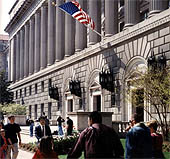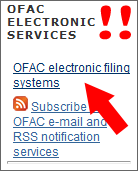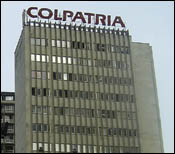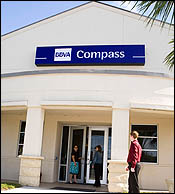 The Bureau of Industry and Security’s Update 2010 conference started off this morning with free coffee and pastries, a military honor guard procession, and the Star Spangled Banner. At first, it was hard to tell whether I was attending a military parade or a sporting event. But, of course, I was in a stuffy ballroom in the Grand Hyatt Washington with about 3 million other people stuffed cheek-to-jowl like coach class on Aeroflot. This could only mean it wasn’t a parade or a ball game but instead BIS’s annual conference for exporters. Here are a few highlights.
The Bureau of Industry and Security’s Update 2010 conference started off this morning with free coffee and pastries, a military honor guard procession, and the Star Spangled Banner. At first, it was hard to tell whether I was attending a military parade or a sporting event. But, of course, I was in a stuffy ballroom in the Grand Hyatt Washington with about 3 million other people stuffed cheek-to-jowl like coach class on Aeroflot. This could only mean it wasn’t a parade or a ball game but instead BIS’s annual conference for exporters. Here are a few highlights.
Eric Hirschhorn, Under Secretary for Industry and Security, after summarizing parts of the ongoing (and welcome) export reform initiative, injected a more somber, and frankly somewhat disconcerting, note:
I ask that you carry a message back to your senior management and those who market your products. … [W]e are planning increased efforts against individuals who flout the rules and against companies whose inadequate internal compliance programs tell us that they are indifferent to whether they follow the rules.
Having a compliance program was always considered a mitigating factor in an enforcement action, but Under Secretary Hirschhorn’s statement goes far beyond that. Now, apparently, not having a compliance program can trigger an enforcement action.
What is disturbing about this is the Export Administration Regulations do not require an exporter to have a formal compliance program. Many small exporters, who are nonetheless otherwise in compliance with export regulations, can’t afford, and shouldn’t have to implement, a formal written program. Does a mom and pop exporter gain anything by adopting a sixty-page compliance program? More significantly, if BIS is going to effectively require a compliance program, it should adopt a rule saying so, with provisions detailing what is expected in a compliance program. It should not simply jawbone exporters with threats of huge fines and worse if they don’t do something that is not affirmatively required by the agency’s own regulations.
Assistant Secretary Kevin Wolf provided more detail on the export reform initiative in his speech (which I recommend you read in its entirety). Assistant Secretary Wolf’s speech included this interesting passage:
For example, the current plan is that revised USML categories must not contain any (a) catch-all controls for generic “parts,†“components,†“accessories,†“attachments,†or “end-items†or (b) other types of controls for specific types of defense articles because, for example, they were “specifically designed or modified†for a defense article.
Also, items are not to be listed on both the CCL and the USML unless there are specific technical or other objective criteria –- regardless of the reason why any particular item was designed or modified –- that distinguish between when an item is USML-controlled and when it is CCL-controlled.
“Specially designed†–- which is different than “specifically designed†— is to be used as a control criterion only when required by multilateral obligations or when no other reasonable option exists.
The distinction between “specially designed” and “specifically designed” prompted a chuckle from the audience. I’m not sure whether this was because most audience members understood that the difference between “specially” and “specifically” is that the Wassenaar Munitions List uses the former and the USML uses the latter. More likely it was because many members of the audience were sadly acquainted with the fine metaphysical arguments required in many commodity jurisdiction requests to determine whether an item was specifically designed for military use.
But notice the two exceptions: treaty obligations and no other reasonable option. I don’t think these exceptions will swallow the new rule, but I can’t help but wonder how broad these exceptions will turn out to be. The Wassenaar Munitions List is littered with references to items that are “specially designed” for military use.
Finally, in a breakout group on economic sanctions, Andrea Gacki, Assistant Director of Licensing at the Office of Foreign Assets Control (“OFAC”) announced that OFAC was about to debut an electronic licensing system for license applications for exports of agricultural products, medicine and medical devices under the Trade Sanctions Reform and Export Enhancement Act of 2000 (“TSRA”). Gacki wouldn’t say when this would occur, but she intimated that they were hoping to roll out the electronic system sooner rather than later. Exporters will certainly welcome an electronic system. One person in the licensing division who spoke to me at the end of the breakout was also looking forward to the new system because, apparently, some license applications filed by exporters are literally boxes of documents that have to be rolled into the licensing division.
 Last week, this blog reported OFAC’s announcement at the BIS Update that an electronic licensing system for agricultural and medical exports under the Trade Sanctions Reform and Export Enhancement Act of 2000 (“TSRA”) would debut “soon.” And by “soon” they meant “real soon,” because over the past several days the new system stealthily sneaked onto the OFAC site and is now, it would appear, ready to accept applications.
Last week, this blog reported OFAC’s announcement at the BIS Update that an electronic licensing system for agricultural and medical exports under the Trade Sanctions Reform and Export Enhancement Act of 2000 (“TSRA”) would debut “soon.” And by “soon” they meant “real soon,” because over the past several days the new system stealthily sneaked onto the OFAC site and is now, it would appear, ready to accept applications.
 Posted by
Posted by  Category:
Category: 

 The Bureau of Industry and Security’s Update 2010 conference started off this morning with free coffee and pastries, a military honor guard procession, and the Star Spangled Banner. At first, it was hard to tell whether I was attending a military parade or a sporting event. But, of course, I was in a stuffy ballroom in the Grand Hyatt Washington with about 3 million other people stuffed cheek-to-jowl like coach class on Aeroflot. This could only mean it wasn’t a parade or a ball game but instead BIS’s annual conference for exporters. Here are a few highlights.
The Bureau of Industry and Security’s Update 2010 conference started off this morning with free coffee and pastries, a military honor guard procession, and the Star Spangled Banner. At first, it was hard to tell whether I was attending a military parade or a sporting event. But, of course, I was in a stuffy ballroom in the Grand Hyatt Washington with about 3 million other people stuffed cheek-to-jowl like coach class on Aeroflot. This could only mean it wasn’t a parade or a ball game but instead BIS’s annual conference for exporters. Here are a few highlights. [This is the third post in a row on OFAC, which is just a coincidence. The blog is not about to be renamed OFACLawBlog.]
[This is the third post in a row on OFAC, which is just a coincidence. The blog is not about to be renamed OFACLawBlog.]  Last week, the Department of Treasury’s Office of Foreign Assets Control (“OFAC”) published a
Last week, the Department of Treasury’s Office of Foreign Assets Control (“OFAC”) published a  The
The 

